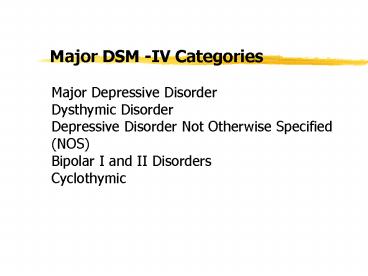Major DSM IV Categories - PowerPoint PPT Presentation
1 / 15
Title:
Major DSM IV Categories
Description:
Manifested by the presence of a depressed mood or loss of enjoyment and interest ... Magnification of trivial events. Learned Helplessness ... – PowerPoint PPT presentation
Number of Views:70
Avg rating:3.0/5.0
Title: Major DSM IV Categories
1
Major DSM -IV Categories
Major Depressive Disorder Dysthymic
Disorder Depressive Disorder Not Otherwise
Specified (NOS) Bipolar I and II
Disorders Cyclothymic
2
Major Depressive Disorder
Manifested by the presence of a depressed mood or
loss of enjoyment and interest in almost
everything and the presence of at least four
below Sad, depressed daily mood Loss of interest
in usual activities Difficulties in sleeping Poor
appetite and weight loss Loss of energy, great
fatigue Negative self-concept Recurrent thoughts
of suicide or death Reduced ability to
concentrate
3
Dysthymic Disorder
Characterized by the presence of chronic
depression, usually mild occurring most days for
at least two years with two or more
symptoms poor appetite or overeating insomnia or
hypersomnia low energy or fatigue low self
esteem difficulty in concentrating/decision
making a sense of hopelessness
4
(No Transcript)
5
Prevalence
Lifetime prevalence rates range from 5.2 to
17.1 Women are twice as likely to develop
depression as are men Higher rates in young
adults and among individuals in lower
socioeconomic groups - also increasing in older
population. Depression prevalence varies
across cultures Prevalence of depression has
been increasing over the last 50 years
6
Cultural variation
- Cultural beliefs about the causes of depression
and the meaning of suicide vary widely. - For example traditional cultural beliefs may lead
to depression being attributed to supernatural
forces, physical illness, character weakness or
fate.
7
Cultural Expression and Interpretation of
Symptoms of Depression
- Somatic symptoms or complaints are common in the
non-western patient. - Sadness may be expressed differently e.g.
repeated sighing. - Loss of pleasure may be the most universal core
symptom. - Cross-cultural research has indicated that in
depression sleep disturbance and early morning
wakening are not culture specific.
8
Risk factors for depression
Low socioeconomic status Ethnicity Sexual,
physical abuse Marriage! (for women only) Number
of children
9
Assessment of Depression
- Psychometrics Observer Rating Scales
e.g.Hamilton or Self-Rating Scales e.g.Beck (BDI
or BHI) - Suitability for therapy
- Beginnings of a formulation
10
First Session
Negative thinking Family problems Use of
alcohol External solutions Difficulties at
school, bullying Difficulties finishing
anything Rejection Risk? Hopelessness/helplessnes
s
11
Psychological Theories of Depression
- Psychoanalytic theory views grief over object
loss as the basis for depression - Cognitive views of depression include
- Becks theory of depression the way depressed
people think is biased towards negative
interpretations - Learned helplessness depressed people are
passive because they have been unable in the past
to control traumatic events - Systemic views of depression involve family
structure and boundaries, and wider contextual
issues such as gender, culture and power.
12
Cognitive Biases in Depression
Arbitrary influence refers to a conclusion drawn
in the absence of sufficient evidence Selective
abstraction refers to a conclusion drawn on one
of many elements in a situation Overgeneralization
refers to an overall sweeping conclusion drawn
on a basis of a trivial event Magnification of
trivial events
13
Learned Helplessness
Learned helplessness view is that depression is
a response to a history of failing to control
traumatic life events The Attribution-Learned
helplessness view is that depressed people make
global, stable and internal attributions Hopelessn
ess view is that depressed persons expect that
desired outcomes will not occur, their actions
will have no effect
14
Interpersonal Theory
- Interpersonal relations are altered in
depression - Depressed people have limited social support
networks - Depressed people elicit rejection from others
- Depressed people are low in social skills across
a wide variety of situations - Depressed people seek reassurance from others,
but this reassurance is temporary
15
Biological Theories of Mood Disorder
- Genetic factors for bipolar disorder are
supported by adoption, family and twin studies - The role of genetic factors in unipolar
depression is not as strong as bipolar disorder - Neurochemistry studies link norepinephrine (NE)
to mania/depression and serotonin (5-HT) to
depression































